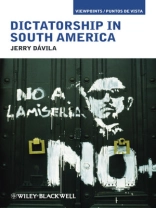Dictatorship in South America explores the experiences of Brazilian, Argentine and Chilean experience under military rule.
* Presents a single-volume thematic study that explores experiences with dictatorship as well as their social and historical contexts in Latin America
* Examines at the ideological and economic crossroads that brought Argentina, Brazil and Chile under the thrall of military dictatorship
* Draws on recent historiographical currents from Latin America to read these regimes as radically ideological and inherently unstable
* Makes a close reading of the economic trajectory from dependency to development and democratization and neoliberal reform in language that is accessible to general readers
* Offers a lively and readable narrative that brings popular perspectives to bear on national histories
Selected as a 2014 Outstanding Academic Title by CHOICE
قائمة المحتويات
List of Illustrations viii
Series Editor’s Preface xi
Preface and Acknowledgements xiii
Introduction 1
1 Dependency, Development, and Liberation: Latin America in the Cold War 9
2 Brazil: What Road to Development? 20
3 Argentina: Between Peronism and Military Rule 55
4 Chile: From Pluralistic Socialism to Authoritarian Free Market 82
5 Argentina: The Terrorist State 112
6 Brazil: The Long Road Back 137
7 Chile: A ‘Protected Democracy’? 156
Conclusion 179
Sources 185
Index 201
عن المؤلف
Jerry Dávila is Jorge Paulo Lemann Professor of
Brazilian History at the University of Illinois. He is the author
of Diploma of Whiteness: Race and Social Policy in Brazil,
1917-1945 (2003) and Hotel Trópico: Brazil and
the Challenge of African Decolonization, 1950 – 1980
(2010), both of which have been translated into Portuguese and
published in Brazil. Dávila has taught in both the United
States and Latin America, where he held the Fulbright Distinguished
Chair in American Studies at the Pontifícia Universidade
Católica in Rio de Janeiro and was a Fulbright Scholar at the
University of São Paulo.












